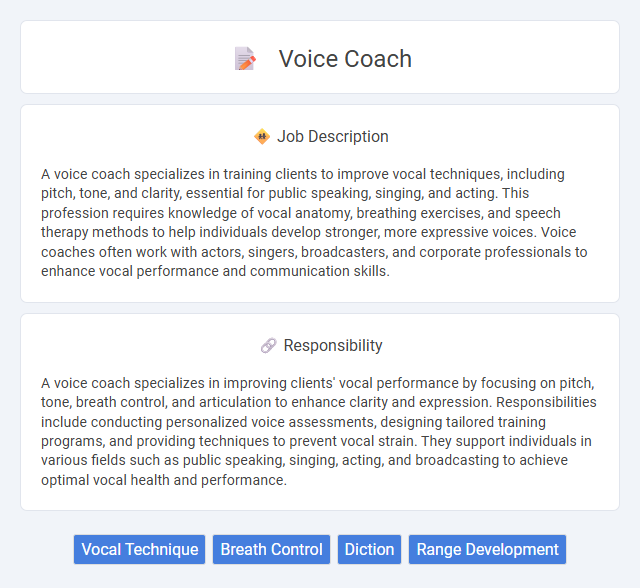
A voice coach specializes in training clients to improve vocal techniques, including pitch, tone, and clarity, essential for public speaking, singing, and acting. This profession requires knowledge of vocal anatomy, breathing exercises, and speech therapy methods to help individuals develop stronger, more expressive voices. Voice coaches often work with actors, singers, broadcasters, and corporate professionals to enhance vocal performance and communication skills.
Individuals with strong communication skills and a passion for vocal health may likely find a voice coach position suitable, as it requires guiding clients to improve their speech or singing abilities. Those who thrive in empathetic and patient environments could be more successful, since the role often involves personalized feedback and support. Conversely, people who struggle with effective listening or lack interest in voice mechanics might not find this career fulfilling.
Qualification
Voice coach positions typically require a bachelor's degree in music, vocal performance, or a related field, alongside extensive experience in vocal training and technique. Strong knowledge of vocal anatomy, breath control, pitch, tone, and ear training is essential for success in this role. Certification from recognized institutions or specialized training in voice therapy can enhance credibility and career prospects.
Responsibility
A voice coach specializes in improving clients' vocal performance by focusing on pitch, tone, breath control, and articulation to enhance clarity and expression. Responsibilities include conducting personalized voice assessments, designing tailored training programs, and providing techniques to prevent vocal strain. They support individuals in various fields such as public speaking, singing, acting, and broadcasting to achieve optimal vocal health and performance.
Benefit
A voice coach job likely offers significant benefits such as enhanced communication skills and increased confidence in public speaking. There is a strong probability that professionals in this role experience personal growth through the mastery of vocal techniques and techniques that improve clarity and expression. Financially, the opportunity to build a flexible client base may contribute to a steady and potentially growing income stream.
Challenge
A voice coach job likely presents challenges related to understanding diverse vocal issues and tailoring techniques to individual needs. Managing client expectations and maintaining consistent progress can require strong communication and adaptability. The role may also involve continuous learning to stay updated with evolving vocal training methods, enhancing overall coaching effectiveness.
Career Advancement
Voice coaches play a crucial role in enhancing clients' vocal abilities, leading to increased demand in entertainment, media, and corporate sectors. Career advancement opportunities include specialization in areas such as speech therapy, accent reduction, or public speaking coaching, often accompanied by certifications and advanced training. Experienced voice coaches can progress to senior consultant roles, establish private practices, or collaborate with renowned institutions for higher earning potential and professional recognition.
Key Terms
Vocal Technique
A voice coach specializes in improving vocal technique by guiding clients on breath control, pitch accuracy, and vocal resonance. They use exercises tailored to strengthen vocal cords, enhance articulation, and expand vocal range. Mastery of vocal technique enables better voice projection, clarity, and endurance for singers, actors, and public speakers.
Breath Control
Voice coaches specialize in improving breath control techniques to enhance vocal performance and stamina. They teach diaphragmatic breathing exercises that increase lung capacity, regulate airflow, and support sustained vocal projection. Mastery of breath control reduces vocal strain and improves clarity for singers, public speakers, and actors.
Diction
A voice coach specializing in diction helps clients improve clarity, enunciation, and pronunciation to enhance verbal communication skills. Mastery of phonetics and targeted exercises allows the coach to correct speech patterns, reduce accents, and promote natural, confident speech delivery. This role is essential for actors, public speakers, and professionals aiming to convey messages effectively and persuasively.
Range Development
Voice coaches specialize in range development by employing targeted vocal exercises that expand pitch capacity and improve flexibility. Techniques such as scale runs, sirens, and controlled breathing enhance vocal stamina and control, allowing singers to reach higher and lower notes with clarity. Consistent practice under professional guidance helps prevent strain and supports healthy vocal progression.
 kuljobs.com
kuljobs.com